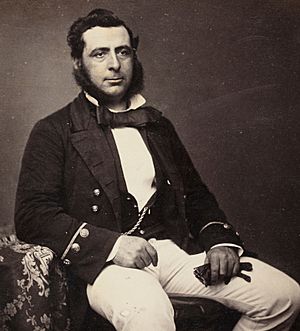John Denis Macdonald facts for kids
Quick facts for kids
Sir
John Denis Macdonald
KCB FRS
|
|
|---|---|

John Denis Macdonald, Officer HMS Herald, ca. 1859, photographer unknown
|
|
| Born | County Cork, Ireland |
| Died | Southall, Middlesex |
| Allegiance | British |
| Royal Navy | |
| Rank | Surgeon General |
| Awards | Fellow of the Royal Society, Knight Commander of the Order of the Bath |
| Alma mater | King's College London, University of St. Andrews |
| Children | William Richard Macdonald |
Sir John Denis Macdonald (born October 26, 1826 – died February 7, 1908) was a very important naval surgeon. A naval surgeon is a doctor who works for the navy, taking care of sailors and officers. He also became a top leader in naval medicine.
Contents
Life and Early Career
John Denis Macdonald was born in Cork, County Cork, Ireland. His father, James Macdonald, was an artist. John went to medical school in Cork and then to King's College, London. He earned his first medical degree in 1849. Later, he received another medical degree from the University of St. Andrews.
Macdonald started his career in the Royal Navy as an assistant surgeon. This meant he was a doctor who helped more senior surgeons. His first job was at the Royal Hospital in Plymouth.
In 1852, he joined a special ship called HMS Herald. This ship was a "survey ship." Survey ships explore and map the oceans and coastlines. While on HMS Herald, Macdonald studied the seabed using a microscope. He looked at tiny things found in the mud and sand from the ocean floor.
Important Discoveries and Awards
His detailed studies with the microscope were very important. Because of his work, he won the Makdougall-Brisbane prize in 1862. This award came from the Royal Society of Edinburgh, a famous group for scientists.
Even more impressively, he was chosen to be a member of the Royal Society in 1859. The Royal Society is one of the oldest and most respected scientific groups in the world. Being a member means you are a top scientist.
Rising Through the Ranks
By 1864, Macdonald had become a full surgeon. He worked at the Royal Hospital Haslar in Gosport, England. In 1870, he became a staff surgeon on HMS Lord Warden. This ship was the main ship, or "flagship," for the navy in the Mediterranean Sea.
In 1872, he took on a new role. He became a professor of naval hygiene at the Army Medical School at Netley. Naval hygiene is about keeping sailors healthy and preventing diseases on ships. He continued this job even after he was promoted to Deputy Inspector-General in 1875. This rank meant he was a senior doctor helping to oversee hospitals and fleets.
In 1880, he was promoted again to Inspector-General. This was a very high position, putting him in charge of naval hospitals and medical services for the entire fleet. From 1883 to 1886, he was in charge of the Royal Naval Hospital at Plymouth. He retired from the navy in 1886.
Special Honors
After King Edward VII became king, Macdonald received a very special honor. He was made a Knight Commander of the Order of the Bath (KCB). This is a high award given by the British monarch for great service. He received this honor in 1902 during the King's Coronation celebrations. The special ceremony took place on the royal yacht Victoria and Albert.
Later Life and Family
After retiring from the navy, Sir John Denis Macdonald continued his scientific interests. He spent time researching zoology (the study of animals) and natural history. He died in Southall, Middlesex, in 1908.
Sir John Denis Macdonald was married twice. He had three sons and two daughters from his first marriage.
 | Audre Lorde |
 | John Berry Meachum |
 | Ferdinand Lee Barnett |

